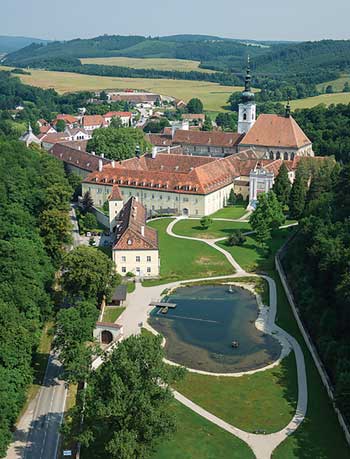Subtotal: $
Checkout-

Is Christian Business an Oxymoron?
-

Not So Simple
-

Comrade Ruskin
-

What Are the Heart’s Necessities?
-

Exposed
-

Who Owns a River?
-

Editors Picks Issue 21
-

Working Girls
-

Was Martin Luther King a Socialist?
-

Gustav Landauer
-

I Begin with a Little Girl’s Hair
-

Kochel: Waterfall I
-

Covering the Cover
-

Anabaptist Readings on Community of Goods
-

The Economics of Love
-

Readers Respond: Issue 21
-

Family and Friends Issue 21
-

The Bronx Agrarian
-

The McDonald's Test
-

What Lies Beyond Capitalism?
-

The Interim God

Robin Hood Economics
How should the wealth of the world be distributed?
By Edmund Waldstein
August 6, 2019
Once, when the Sheriff of Nottingham’s men came across Robin Hood deep in Sherwood Forest, he was kneeling before an altar, hearing Mass. Robin waited until the holy sacrifice was over before turning to fight them. The old ballads consistently describe Robin as a pious and faithful Catholic, scrupulously chaste, who was said to have heard three Masses every day before breakfast. In fact, Robin’s band of merry men is described as following a quasi-monastic rule. They shared a common purse. And according to the sixteenth-century play The Downfall of Robert, Earle of Huntingdon, based on older ballads, they even took a vow of chastity: “Thirdly no yeoman following Robin Hoode / In Sherewood, shall use widowe, wife, or maid, / But by true labour, lustfull thoughts expell.”
Nevertheless Robin loved to rob the abbots and priors of England’s rich, feudal monasteries: “From wealthy abbots’ chests, and churls’ abundant store, / What oftentimes he took, he shar’d amongst the poor.” Those monasteries practiced a certain kind of poverty – they held everything in common, and each monk was to receive only what was necessary from the common stock – yet, corporately, they were rich landowners, and their abbots and priors were influential lords.
The monasteries gave much to the poor, providing a kind of social security. (Indeed, the dissolution of the monasteries by Henry VIII was to lead to a social crisis.) Yet to Robin Hood they were on the side of the rich who take an unfair share of the crops produced by peasants. The only religious whom Robin seemed to like were the mendicant friars, such as Friar Tuck, who were the proponents of a new interpretation of religious poverty, in which there was to be no corporate wealth.
Robin Hood’s contempt for the monasteries of his time raises questions for me about the relation of my monastic community to the wider economic order.
The world described in the Robin Hood ballads of the fifteenth century, when the feudal system was in its post–Black Death decline, is obviously very different from our own world of global capitalism. And yet, Robin Hood can in some ways be a spur to reflection on our own situation.
The implicit foundation of Robin Hood’s stealing from the rich to give to the poor is the perennial Christian teaching that the goods of the earth are given by God for the sustenance of all human beings. This is the principle that modern Catholic social teaching calls the “universal destination of goods,” and it issues an urgent challenge to us in our own time.
As a Cistercian monk, I find that Robin’s contempt for the monasteries of his time raises questions for me about the relation of my monastic community, with its communal sharing of goods, to the wider economic order. This is a question that any community of believers that tries to live like the early Church in Acts 2:44–45 will have to ask: How can we interact with the wider economic system that surrounds us without becoming complicit in the injustices of that system?

N. C. Wyeth, detail of an illustration for Paul Creswick’s Robin Hood.
Jesus’ injunctions on giving freely and without expectation of return fulfill and complete the teachings of the Old Testament. God gave the earth to all humankind. To give to those in need, therefore, is an act of justice, rendering to them what they are due as those to whom God has given the earth.
After the conversion of Constantine, as more of society became Christian and being Christian became less a countercultural choice, the Fathers of the Church were very concerned with correcting wealthy Christians who had lost sight of this principle and were withholding their wealth from those in need. Saint Basil the Great in the East and Saint Ambrose of Milan in the West were particularly insistent on the point. Thus, Basil addresses the rich man in Luke 12:18, who says “This is what I shall do: I shall tear down my barns and build larger ones. There I shall store all my grain and other goods and I shall say to myself, ‘Now as for you, you have so many good things stored up for many years, rest, eat, drink, be merry!’” To this man Saint Basil retorts, “Tell me, what things are yours? Where did you take them from? Did you give them being?” The grain that has grown does not really belong to the rich man; it is for those who need it. Similarly, Saint Ambrose preached a sermon on the story of King Ahab’s coveting of Naboth’s vineyard in which he addressed himself directly to the rich citizens of Milan with searching questions: “How far, O rich, do you extend your mad greed? … Why do you cast out the companion whom nature has given you and claim for yourself nature’s possession? The earth was established in common for all, rich and poor. Why do you alone, O rich, demand special treatment?” It is unjust, Ambrose thinks, for the rich to claim the fruits of the earth for themselves exclusively, when that bounty was given to humankind in common.
In the light of these teachings of scripture and the Church Fathers, the scholastic theologians questioned whether the possession of private property in any sense can be justified.
Saint Thomas Aquinas argued that while the use or enjoyment of goods always has to be common, in the sense that each person only gets to use or consume what they need, the system of producing goods can be private, in the sense that each person can dispose of what they produce. In fact, he gives reasons why it is conducive to a peaceful and just society for there to be private property in that qualified sense. He thinks that people tend to work harder when they have responsibility for what they produce. He gives the example of a household in which there are too many servants: in this case, some of them will not bother to work for the common store, since they can depend on the others to work for them: “Every man is more careful to procure what is for himself alone than that which is common to many or to all: since each one would shirk the labor and leave to another that which concerns the community, as happens where there is a great number of servants.” The experience of the socialist regimes of the twentieth century confirms Saint Thomas’s insight here.
He also argues that things are more orderly when there is private property, whereas confusion would result from communism. The idea seems to be that needs are more efficiently recognized and met when each person has responsibility for what he produces.
Nevertheless, Saint Thomas holds that the use of goods has to remain common. By this he means that each person can only justly keep what he needs to live and appropriately fulfill his role in society. A person who has a representative role in society (the ruler, for example) will need a certain magnificence to fulfill that role, but even here there is a limit. And each person is bound to give away all of his superfluous goods to those in need. This is the principle now known in Catholic theology as the “universal destination of goods.”
According to the principle of the universal destination of goods, all superfluous goods belong to the poor.
A consequence of this principle is that when someone is in urgent need, he may take goods away from someone who has more than enough without committing the sin of theft. This is the justification of the “Robin Hood Principle” of “stealing” from the rich to give to the poor. It is not really stealing if the poor are in real need, and the rich are living in real superfluity. In the Rhineland, this kind of “stealing” is called fringsen after Cardinal Frings, the Archbishop of Cologne, who instructed his flock to “steal” coal from the coal yards of the railway companies when they were dying of cold after the Second World War.
Modern Catholic social teaching, beginning with Pope Leo XII in the nineteenth century, developed the principle of the universal destination of goods and applied it to the problems of modern economies. Thus, Pope Pius XI thought that the government has the duty of regulating private property to rectify unjust distribution. “When the State brings private ownership into harmony with the needs of the common good,” he wrote in 1931, “it does not commit a hostile act against private owners but rather does them a friendly service; for it thereby effectively prevents the private possession of goods, which the Author of nature in His most wise providence ordained for the support of human life, from causing intolerable evils.” In 1952 Pope Pius XII taught that the universal destination of goods required prosperous countries to receive needy migrants from poor countries.

Stift Heiligenkreuz, a Cistercian abbey in Austria, where the author is a monk
The actual phrase “universal destination of goods” was coined by the Second Vatican Council: “Whatever the forms of property may be, as adapted to the legitimate institutions of peoples, according to diverse and changeable circumstances, attention must always be paid to this universal destination of earthly goods.” The council hinted that in a globalized economy, traditional means of realizing the principle would sometimes have to be changed. Pope Paul VI developed this insight in the encyclical Populorum Progressio, in which he emphasizes that the connections that have arisen between peoples of different parts of the world imposes responsibilities on those who live in rich countries. We cannot be content to live in superfluity when there are children starving in poorer parts of the world.
While the Catholic Church continues to hold Saint Thomas’s position that a limited kind of private property can be just, nevertheless she has also always held that it is more perfect for Christians to live in communities in which not only the distribution, but also the production of goods is common. It has usually been thought that while absolute community of goods is not beneficial for society at large, it is very beneficial indeed for monastic communities. As monks we have dedicated ourselves to living as a sign of the Heavenly Jerusalem that is to come. We do not marry and are not given in marriage; we submit to the obedience of a rule and an abbot; we hold all things in common.
Since the beginnings of the monastic movement in third-century Egypt, it has been held that community of goods is closely connected to celibacy and obedience. Without the freedom from worldly care that comes from celibacy (1 Cor. 7:33), and the discipline of obedience, the community of goods would not be beneficial. And without community of goods, and care against any superfluous wealth, celibacy and obedience would become lax. One of the things that I find fascinating about communities such as the Bruderhof is that they seem to provide a counterexample to this ancient wisdom, insofar as they have obedience and community of goods without celibacy.
My own monastery, Heiligenkreuz Abbey in Austria, lives according to the rule of Saint Benedict of Nursia. Saint Benedict is emphatic. “Above all,” he writes,
this vice of private property has to be cut out of the monastery by its roots. Let no one presume to give or accept anything without the abbot’s orders, nor to have anything as his own. Not anything at all: neither book, nor writing-tablet, nor pen; nothing whatsoever, since he is not even allowed power over his own body and will. But let everyone look to the abbot of the monastery to receive what is needful. Nor can they keep anything which the abbot has not given or allowed. Let all things be common to all, as it is written: “no one said that any of the things which he possessed was his own” (Acts 4:32).
Saint Benedict wants his monks to live from the work of their own hands, and to be generous in sharing the goods they produce with the poor and with travelers. He recognizes that the monks will sometimes have to sell their goods in order to buy others which they cannot produce themselves. But he commands them to sell them at their true value, so that the purpose of the transaction is exchange rather than profit: “And in the prices themselves, let not the vice of avarice creep in, but let things always be sold somewhat cheaper than by worldly persons, that in all things God may be glorified.”
Saint Benedict’s form of monastic life turned out, perhaps unexpectedly, to be what we would now call an economic success. The efficient division of labor achievable by a community living under a vow of obedience meant that monasteries were good at producing goods. The principle of always selling at cheaper prices than non-monastic producers turned out to be an effective means of attracting buyers.
Yet there was a danger latent here. Many monasteries became very rich, and their great stores of goods had a corrupting influence on monastic discipline. This problem was compounded in the Middle Ages, as monasteries came to be integrated more and more into the feudal system. Often monasteries came to rule over feudal lands, and over the serfs who worked those lands. In the eleventh century in the great French monastery of Cluny the monks spent almost the whole day in prayer. They no longer lived from the work of their own hands, as the rule commanded, because they had serfs to work for them. Not surprisingly, the serfs sometimes resented their monastic overlords, and thought that they took an unjust share of the produce of the serfs’ labor.
I must admit that Robin Hood would probably disapprove of me.
My own order, the Cistercian order, was founded partly in reaction to that problem. The Cistercians wanted to return to a literal observance of the rule, living from their own manual labor. Nevertheless, even in the Cistercian order, the greater part of the manual labor was soon done by the illiterate “lay brothers” (peasants who had entered the monastery) while the educated “choir brothers” (recruited from the gentry) were more engaged in intellectual labor – copying manuscripts, teaching, writing theological treatises – and in more frequent formal prayer. Moreover, when they were given lands to found a monastery, the people giving the lands would often relocate the serfs who had been there before. My monastery was founded in 1133 when Saint Leopold III, margrave of Austria, donated some of his feudal possessions for our foundation. In the woods behind our monastery one can still see a few stone walls belonging to a village whose inhabitants were relocated when our monastery was founded. I often wonder what the serfs who lived there thought when they had to leave their home. Later on, the Cistercians, too, ruled over peasant inhabitants in their territories.
Today, my monastery still has many of the lands that were given to us in the Middle Ages, and we live principally from the timber, grain, and wine grown on them. A few monks still work the land, but on account of various necessities through the centuries, most of the monks now “work” as parish priests in nearby parishes, or as teachers in our theological college (as I do). But this means that most of the work in our forests, fields, and vineyards is now done by wage labor. Our workers and employees like to quote the old saying, “life is good under a crooked staff” – meaning that clerical masters (symbolized by the pastoral staff or crozier) are more lenient than lay ones. In fact, we try to follow Catholic social teaching in treating those we employ; we pay them a living wage, and so on.
But this sometimes leads to difficult situations. For example, we used to have a sawmill to process the timber from our forests. If we could have worked the sawmill entirely with the labor of monks, it would have been profitable, but since we had to employ wage laborers, and since we paid them a living wage, it could not compete with the large-scale sawmills run by competitor corporations. Eventually, after losing money on the sawmill for several years, we decided to close it down. It was a difficult decision, and the difficulty arose from the almost inevitable necessity of interacting with the larger capitalist system that surrounds us. The system has its own dynamic, which is hard to escape.

N. C. Wyeth, detail of an illustration for Paul Creswick’s Robin Hood.
According to the principle of the universal destination of goods, all superfluous goods belong by right to the poor. But the difficulty comes in determining what really is superfluous. The human heart is devious, and skilled in self-deception. It is perhaps easier for communities to judge objectively about this than individuals. But even in communities one can find what Eberhard Arnold, cofounder of the Bruderhof, called “collective egoism.”
My own experience of living out community of goods in the monastery has been a liberating one. Since I receive everything that I need from the monastery I am free to devote myself to prayer, to teaching theology, and to my other duties. But I must admit that Robin Hood would probably disapprove of me. Although my monastery tries to give away as much of our income as possible, nevertheless we monks live fairly comfortable lives, with good food and warm rooms. Saint Benedict lists the necessary things that a monk should receive from the abbot: two cowls, two tunics, sandals, shoes, a girdle, a knife, a pen, a needle, a handkerchief, and a writing tablet. I’m afraid that in addition to cowl and tunic I have coats, jackets, socks, skiing equipment, and so on. That writing tablet has now become a laptop. I am even given a monthly allowance of pocket money for buying books, chocolate, and other luxuries.
But, of course, whether Robin Hood would approve of us or not, we are grateful for the good things that God gives. The primary purpose of monastic poverty is not to despise the gifts that God has given to humankind, but to conform ourselves to Christ. There is a time for fasting and doing penance, but there is also a time for feasting, and using the goods of the earth to express joy. “For John came neither eating nor drinking, and they say, ‘He has a demon’; the Son of Man came eating and drinking, and they say, ‘Behold, a glutton and a drunkard’” (Matt. 11:18–19).
This was a lesson that the early Cistercians had to learn. In the early years of Saint Bernard’s monastery at Clairvaux, the monks were unwilling to eat anything that tasted good. But when William of Champeaux, the Bishop of Châlons-sur-Marne, visited them, he taught them to accept their food with thanksgiving: “You will be safe in doing so, for through God’s grace it has become fit for you to use. On the other hand, if you still remain disobedient and incredulous, you will be resisting the Holy Spirit and so be ungrateful for his grace.”
In the old ballads, Robin Hood is famous for his generous woodland feasts. So on this point at least, he and the bishop would have seen eye to eye.

Sign up for the Plough Weekly email
Already a subscriber? Sign in
Try 3 months of unlimited access. Start your FREE TRIAL today. Cancel anytime.
































Ken Madsen
A wonderful treatise in the economic dynamics between private property and free enterprise on one side and Catholic social teaching on the other. I believe the dichotomy, well defined by "collective egoism" is exacerbated in secular society. As the global economy shows, there is an insatiable desire for more, better and cheaper. In a monastery, where all members share a fundamental value - in your example, the Rule, the common good is easier to identify. I believe in G.K. Chesterton's view of distributism where more capital is in the hands of the common man (vs. large international corporations). Decisions are more local and the community benefits from the "surplus" of small businesses and/or farms. An example of this in action are craft beers, which have proliferated throughout the United States. The beer is better, there are more choices and many people receive a just wage and good living. Another example is more local to you - Woom bicycles. I have one for my boy - great bike, light and durable, perfect for kids. More expensive - thanks be to God that I'm lucky enough to afford one - but worth the value. I pray more small enterprises come into existence to benefit the common man through his labors and capital. Thanks for a great article. I will share this with all my friends God bless you!
R S
Very lucid walk into catholic social teaching. Great illustrations.